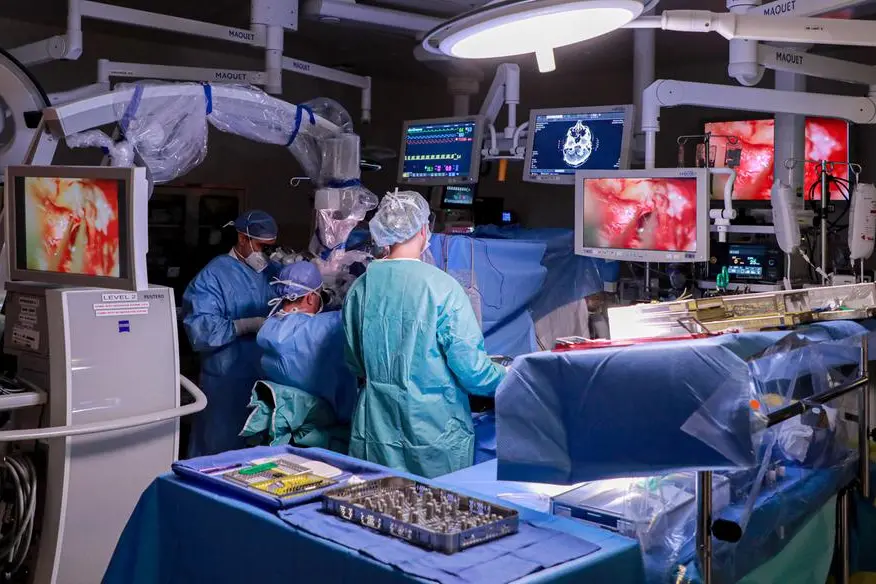PHOTO
Abu Dhabi, United Arab Emirates: Cleveland Clinic Abu Dhabi’s Neurological Institute has successfully performed over 600 neurosurgeries this year and has served more than 32,000 patients in its outpatient clinics during the first half of the year.
With 15 subspecialties, including the Neurovascular Medicine Program & Stroke Center, Parkinson’s Disease and Research Center, and the Epilepsy Program, the hospital is the first in the UAE to perform both stereotactic encephalography or SEEG procedure, a minimally invasive surgical technique that pinpoints the origins of hard-to-treat focal epileptic seizures within the brain and Deep Brain Stimulation Surgery (DBS) for Epilepsy to control and reduce the recurrence of seizures.
At a roundtable event that happened at Cleveland Clinic Abu Dhabi, Dr. Mohamad Ayman Haykal, staff physician, Neurological Institute, Cleveland Clinic Abu Dhabi said, “Epilepsy surgery has been around for a long time in history. Even though the efficacy of the surgery is well established, it is one of the most underutilized treatments in the history of neurological disorder, especially in the region because of lack of technology and the expertise needed. We at Cleveland Clinic Abu Dhabi are trying to bridge that gap by bringing the latest advancements to UAE like SEEG and DBS for patients to lead a more quality life.”
Dr. Eugene Achi, staff Physician, Neurological institute, Cleveland Clinic Abu Dhabi further explained and said, "Treating epilepsy requires a comprehensive team approach. Nearly half of epilepsy patients experience mood disorders and memory problems, making the involvement of psychologists, psychiatrists and neuropsychologists essential. When it comes to the surgical treatment of focal epilepsy, where seizures originate from a specific area of the brain, the expertise of top neurosurgeons, radiologists, and epileptologists is crucial. What sets Cleveland Clinic Abu Dhabi apart is our ability to bring together these leading experts who collaborate closely to ensure the best outcomes for our patients. Additionally, we have cutting-edge technologies, like MRI post-processing techniques, electric source imaging, PET scans and ictal SPECT scans. These tools are critical in guiding surgical decisions, in particular, the stereo-EEG (SEEG) exploration plan."
With over 75 DBS surgeries performed since the beginning of movement disorder program in 2020, Dr. Florian Roser, Chair of Neurological Institute said, “The program at Cleveland Clinic Abu Dhabi is established as one of the largest programs for movement disorder in the country. Initially started for Parkinson’s, we now offer DBS surgery for Epilepsy, chronic pain and tremors. The use of DBS is one of the best examples of how we are driving innovation and how we are advancing treatment options with a multidisciplinary approach.”
The hospital is also the first in the region to use the ARTIS Icono system for advanced stroke interventional procedures. Explaining the stroke alert pathways, Dr. Victoria Ann Mifsud, Staff Physician at the Neurological Institute, Cleveland Clinic Abu Dhabi, emphasized, "At Cleveland Clinic Abu Dhabi, we've strategically developed a highly efficient and standardized stroke response pathway that ensures rapid diagnosis and treatment. The moment a stroke patient arrives in our emergency room, our hyperacute, multidisciplinary team—comprising ED physicians, nurses, neurologists, radiologists, imaging techs, neurointerventionalists, anesthesiologists and many others – is immediately mobilized. This collaborative approach has allowed us to significantly outperform global benchmarks, with a median tPA administration time of just 35 minutes, far exceeding the standard 60 minutes. Additionally, we're pioneering new treatment protocols to include previously untreatable cases, such as wake-up strokes, and patients with poor imaging in our hyperacute treatment criteria, reflecting our commitment to pushing boundaries and achieving superior patient outcomes."
“On an average, we're admitting about 1,000 ischemic stroke cases a year and close to 200 intracranial hemorrhages a year. In fact, so far this year till July, we admitted more than 500 ischemic cases and more than 100 acute hemorrhagic cases,” added Dr. Victoria.
Commenting on the advancements and achievements of the Neurological Institute, Dr. Florian Roser, Chair of the Neurological Institute at Cleveland Clinic Abu Dhabi, stated, "Our institute exemplifies the power of a multidisciplinary approach, where experts from emergency medicine, stroke neurology, interventional neuroradiology, cerebrovascular surgery, and diagnostic radiology work in seamless collaboration. By integrating these critical disciplines, we deliver the highest standard of care, combining cutting-edge diagnostic techniques with minimally invasive surgical procedures and innovative therapeutic interventions. With the addition of AI-driven technologies, we're not only enhancing our precision in diagnosis and treatment but also pushing the boundaries of what's possible in neurological care, ultimately improving outcomes and setting new benchmarks in patient care."
The Neurological Institute of the hospital is also Certified as a Comprehensive Stroke Center by the Middle East and North Africa Stroke Organization (MENASO) and the American Stroke Association® (ASA) and designated as a North American Skull Base Society (NASBS) Multidisciplinary Team of Distinction. This prestigious recognition is awarded to institutions with multidisciplinary NEUROLOGICAL INSTITUTE PUBLIC skull base surgery teams, which include professionals from a variety of specialties, including neurosurgery, otolaryngology, radiology, and more, and with at least four NASBS members.



















